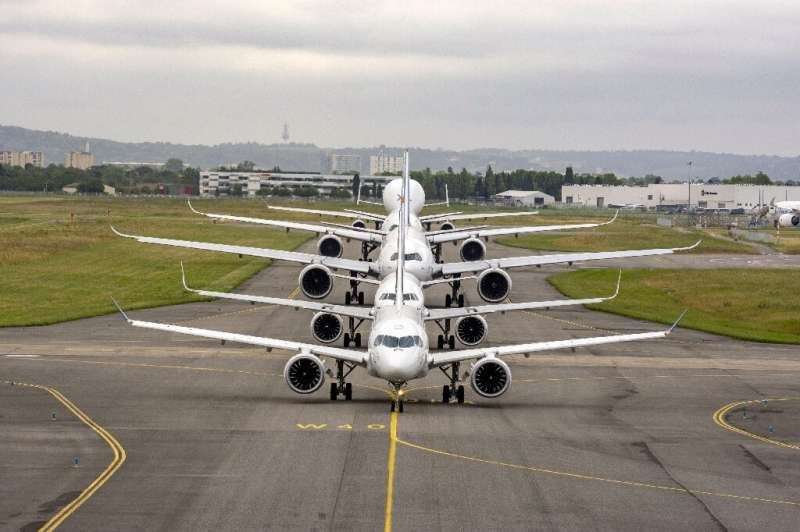European airlines claim that an unprecedented EU tax on jet fuel would ground them and benefit rivals from outside the 27-nation bloc.
The European Commission will propose a raft of measures to slash EU aviation emissions when it unveils a bumper package of legislation Wednesday aimed at reaching its climate goals.
But the push, including an unprecedented tax on highly polluting jet fuel, is facing strong headwinds from airlines in the bloc, who fear they will have their wings clipped.
Brussels argues that a new levy on kerosene for flights inside the EU is a must if the 27-nation bloc is serious about reaching its ambitious target of cutting greenhouse gas emissions by 55 percent compared with 1990 levels by 2030.
The aviation sector—which makes up about three percent of current EU emissions—insists the tax would make it unable to compete with rivals from outside the bloc.
And the proposal is set to be one of the thorniest issues when European lawmakers, EU member states, lobbyists and green activists start what is expected to be months of furious haggling to shape the final laws.
The proposed legislation, seen by AFP, lays out the strategy envisioned by the EU executive.
The tax—to be introduced gradually over a decade—would be based on how energy efficient and environmentally friendly different types of kerosenes are.
The aim is to convince carriers to switch to more "sustainable" mixes that contain some biofuels. These would not be taxed.
Due to international legal constraints, private jets and cargo planes would remain exempt from the new levy.
The commission also plans to issue a separate directive aimed at boosting the—still very modest—use of "sustainable fuels".
Cheap fuel havens?
Some member states have already come out in favour of the plan.
Belgium, Luxembourg and Austria wrote an open letter calling for a kerosene tax to be applied "without delay" in the EU—and pushing for the same measure to be adopted internationally.
Meanwhile, the EU's airline sector has hit back with its own concerns.
A group of eleven major companies including Air France-KLM and Lufthansa warned that the moves would "significantly increase the competitive advantage of non-EU airlines and non-EU hub airports compared to their EU counterparts".
The carriers, struggling to overcome the huge hit to business from the coronavirus pandemic, cautioned the plan could spur so-called "carbon leakage"—including seeing airliners fill up in countries on the EU's fringes like Turkey or Britain to avoid the charge.
"Climate policy regulation in the form of taxes is ecologically and economically counterproductive," complained Laurent Donceel, from the lobby group Airlines for Europe.
"It reduces the aviation industry's capacity to invest and innovate whilst potentially shifting CO2 emissions to other regions, an effect known as carbon leakage."
European Parliament member Dominique Riquet, from the liberal Renew Europe bloc, said there would be a big debate among lawmakers "if competitiveness is not preserved" for EU carriers.
Any knock-on effect that might see ticket prices go up for travellers would "not be very popular", he warned.
'Hypocrisy'
But environmental groups are already worried that the commission's proposal is too weak—and fear any further push to water it down could be disastrous.
"A low tax rate, a delayed implementation, and a series of exemptions, including for private trips, air cargo and business aviation, could gut new measures of any real impact in this crucial decade," Greenpeace said.
The group said more radical plans were needed to wean people off air travel all together including banning short haul flights when there were convenient alternatives.
Aviation remains heavily dependent on kerosene to get its planes in the air—and biofuels are blamed for adding to other problems like deforestation.
The development of hydrogen-fuelled planes is believed to be 15 years away at best and aircraft powered by electricity remain limited by the performance of current batteries.
"Betting on false solutions, like unrealistic 'green' planes powered by unsustainable biofuels, and encouraging a return to pre-pandemic levels of flying, as foreseen by the sector, would only expose the hypocrisy of European governments when it comes to climate action," Greenpeace said.
© 2021 AFP
























